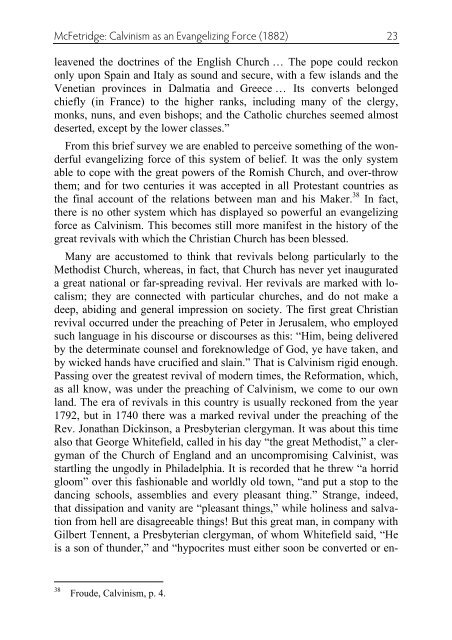Calvin and Missions - World Evangelical Alliance
Calvin and Missions - World Evangelical Alliance
Calvin and Missions - World Evangelical Alliance
Create successful ePaper yourself
Turn your PDF publications into a flip-book with our unique Google optimized e-Paper software.
McFetridge: <strong>Calvin</strong>ism as an Evangelizing Force (1882) 23<br />
leavened the doctrines of the English Church … The pope could reckon<br />
only upon Spain <strong>and</strong> Italy as sound <strong>and</strong> secure, with a few isl<strong>and</strong>s <strong>and</strong> the<br />
Venetian provinces in Dalmatia <strong>and</strong> Greece … Its converts belonged<br />
chiefly (in France) to the higher ranks, including many of the clergy,<br />
monks, nuns, <strong>and</strong> even bishops; <strong>and</strong> the Catholic churches seemed almost<br />
deserted, except by the lower classes.”<br />
From this brief survey we are enabled to perceive something of the wonderful<br />
evangelizing force of this system of belief. It was the only system<br />
able to cope with the great powers of the Romish Church, <strong>and</strong> over-throw<br />
them; <strong>and</strong> for two centuries it was accepted in all Protestant countries as<br />
the final account of the relations between man <strong>and</strong> his Maker. 38 In fact,<br />
there is no other system which has displayed so powerful an evangelizing<br />
force as <strong>Calvin</strong>ism. This becomes still more manifest in the history of the<br />
great revivals with which the Christian Church has been blessed.<br />
Many are accustomed to think that revivals belong particularly to the<br />
Methodist Church, whereas, in fact, that Church has never yet inaugurated<br />
a great national or far-spreading revival. Her revivals are marked with localism;<br />
they are connected with particular churches, <strong>and</strong> do not make a<br />
deep, abiding <strong>and</strong> general impression on society. The first great Christian<br />
revival occurred under the preaching of Peter in Jerusalem, who employed<br />
such language in his discourse or discourses as this: “Him, being delivered<br />
by the determinate counsel <strong>and</strong> foreknowledge of God, ye have taken, <strong>and</strong><br />
by wicked h<strong>and</strong>s have crucified <strong>and</strong> slain.” That is <strong>Calvin</strong>ism rigid enough.<br />
Passing over the greatest revival of modern times, the Reformation, which,<br />
as all know, was under the preaching of <strong>Calvin</strong>ism, we come to our own<br />
l<strong>and</strong>. The era of revivals in this country is usually reckoned from the year<br />
1792, but in 1740 there was a marked revival under the preaching of the<br />
Rev. Jonathan Dickinson, a Presbyterian clergyman. It was about this time<br />
also that George Whitefield, called in his day “the great Methodist,” a clergyman<br />
of the Church of Engl<strong>and</strong> <strong>and</strong> an uncompromising <strong>Calvin</strong>ist, was<br />
startling the ungodly in Philadelphia. It is recorded that he threw “a horrid<br />
gloom” over this fashionable <strong>and</strong> worldly old town, “<strong>and</strong> put a stop to the<br />
dancing schools, assemblies <strong>and</strong> every pleasant thing.” Strange, indeed,<br />
that dissipation <strong>and</strong> vanity are “pleasant things,” while holiness <strong>and</strong> salvation<br />
from hell are disagreeable things! But this great man, in company with<br />
Gilbert Tennent, a Presbyterian clergyman, of whom Whitefield said, “He<br />
is a son of thunder,” <strong>and</strong> “hypocrites must either soon be converted or en-<br />
38 Froude, <strong>Calvin</strong>ism, p. 4.

















